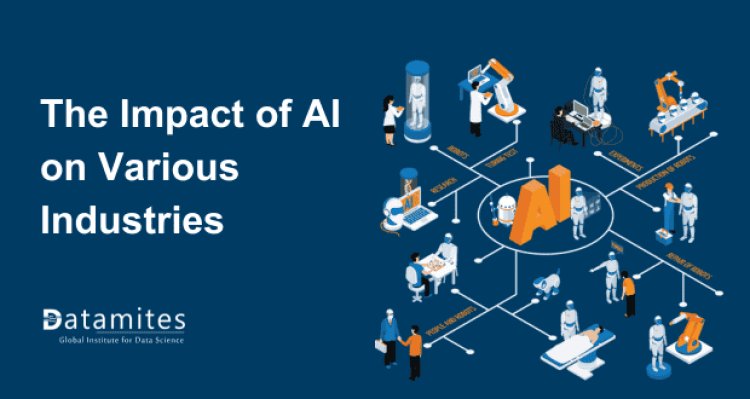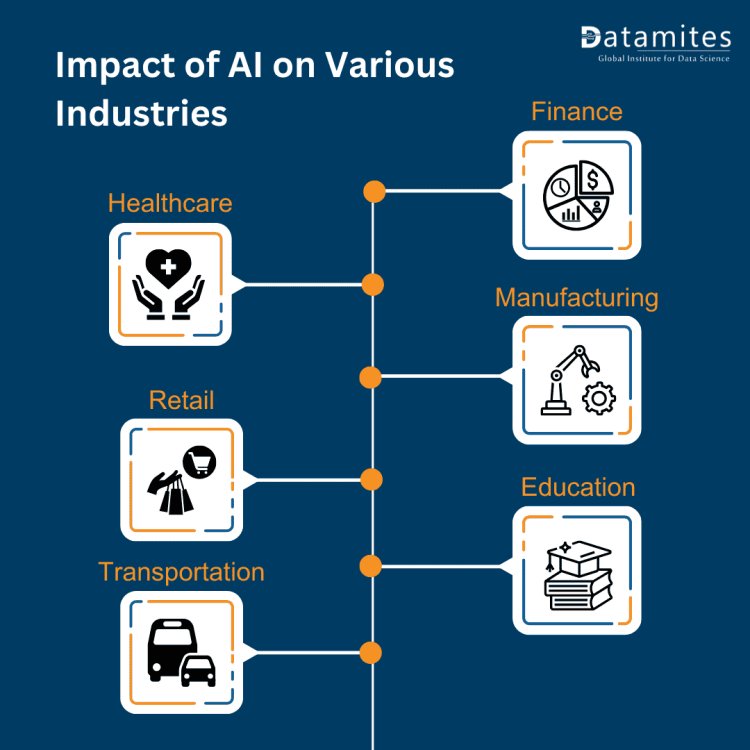The Impact of AI on Various Industries: Current and Future Trends
AI is revolutionizing industries by enhancing efficiency, automating tasks, and driving innovation. As technology evolves, its impact will reshape business models, workforce dynamics, and customer experiences.

Artificial Intelligence (AI) is more than just a trending topic; it's a powerful force driving change across multiple sectors. A McKinsey report estimates that AI could contribute up to $13 trillion to the global economy by 2030. This staggering statistic highlights AI's relevance and importance in our modern world.
The purpose of this blog post is to explore the current and future trends of AI across multiple sectors. From healthcare to transportation, we will delve into how AI is revolutionizing operations and paving the way for new opportunities. We'll also discuss the challenges and ethical implications associated with Artificial Intelligence integration. By the end, you will gain a comprehensive understanding of how Artificial intelligence impacts our lives today and what lies ahead.
Overview of Artificial Intelligence Technology
Artificial Intelligence (AI) involves creating machines that can mimic human intelligence through programming that enables them to think and learn. The core components of AI include:
- Machine Learning (ML): Techniques that allow systems to learn from data and enhance their performance over time without needing direct programming.
- Natural Language Processing (NLP): The capability of machines to comprehend and interact with human language in a significant manner.
- Computer Vision: The ability of AI to analyze and make decisions using visual information.
Evolution of Artificial Intelligence
Artificial Intelligence has made remarkable progress since its early days, when systems were constrained to rule-based programming. However, with the advent of machine learning and neural networks, AI technologies have seen exponential growth. Today, businesses are increasingly adopting AI to enhance operational efficiency and improve customer experiences.
- Increased Adoption: Companies across sectors are leveraging AI to automate processes, analyze vast amounts of data, and personalize user experiences.
- Technological Advancements: Innovations in hardware and algorithms continue to fuel AI's rapid advancement.
Read these articles:
- Computer Vision: An Overview of Techniques and Applications
- Why Artificial Intelligence Career in 2024
- AI Ethics: Navigating the Ethical Challenges of AI Development

Current Impact of Artificial Intelligence on Various Industries
Artificial intelligence (AI) is significantly transforming various industries, driving efficiency, innovation, and new business models. Here’s a look at the current impact of AI across different sectors:
1. Healthcare: Revolutionizing Patient Care
AI's application in healthcare is profound, transforming diagnostics, patient care, and personalized medicine. With the ability to analyze vast datasets, AI can help identify patterns that human practitioners might overlook.
- Diagnostics: AI algorithms can accurately analyze medical images, detect diseases like cancer at earlier stages, and improve diagnostic accuracy.
- Patient Care: Virtual health assistants and chatbots are streamlining patient interactions, providing instant support for routine inquiries.
- Case Study: IBM's Watson Health is a prime example, as it aids healthcare professionals in diagnosing and treating patients based on extensive medical data.
2. Finance: Enhancing Security and Efficiency
The finance industry has embraced AI for its potential to increase efficiency and security. By analyzing transaction patterns and customer behavior, AI helps institutions minimize risks and enhance service delivery.
- Fraud Detection: AI systems can detect anomalies in transactions, alerting institutions to potential fraud in real-time.
- Algorithmic Trading: Machine learning algorithms analyze market trends and execute trades faster than human traders, maximizing profits.
- Statistics: According to a report by Deloitte, AI implementation in financial services can lead to a 20% reduction in operational costs.
3. Retail: Crafting Personalized Shopping Experiences
AI is transforming the retail landscape by enabling businesses to offer personalized shopping experiences. Through data analysis and customer insights, retailers can better understand consumer behavior.
- Recommendation Engines: Algorithms suggest products based on previous purchases and browsing behavior, increasing sales and customer satisfaction.
- Inventory Management: AI systems optimize stock levels, reducing waste and ensuring products are available when customers need them.
- Trend: AI-driven virtual fitting rooms are gaining popularity, enabling shoppers to digitally try on outfits before completing their purchase.
4. Manufacturing: Driving Efficiency and Quality Control
AI is transforming manufacturing by boosting efficiency, optimizing quality control, and driving down costs.
- Predictive Maintenance: AI analyzes machinery data to predict failures before they occur, minimizing downtime.
- Quality Control: AI-powered systems inspect products for defects in real time, ensuring high-quality standards are met.
- Example: General Electric (GE) uses AI to optimize its manufacturing processes, resulting in significant cost savings and efficiency gains.
5. Transportation: Paving the Way for Smart Mobility
The transportation sector is undergoing a dramatic transformation due to Artificial Intelligence, particularly in the development of autonomous vehicles and smart transportation systems.
- Autonomous Vehicles: Self-driving cars use AI to navigate complex environments, promising to reduce accidents and improve traffic flow.
- Traffic Management: AI technologies monitor traffic patterns in real-time to adjust signal timings and alleviate congestion.
- Current Development: Companies like Waymo are leading the way in autonomous vehicle technology, continuously testing and refining their systems for commercial use.
6. Education: Personalizing Learning Experiences
Artificial Intelligence is enhancing education by personalizing learning experiences, automating administrative tasks, and facilitating virtual classrooms.
- Personalized Learning: AI platforms evaluate student performance data to tailor educational content to meet individual needs.
- Administrative Automation: AI systems streamline administrative tasks, allowing educators to focus more on teaching and less on paperwork.
Future Trends of Artificial Intelligence Across Industries
Artificial Intelligence (AI) is transforming industries worldwide, with future trends indicating significant advancements and broader adoption across various sectors. Here are some key trends shaping the future of AI across industries:
1. Enhanced Personalization
As AI technologies evolve, businesses will increasingly leverage Artificial Intelligence for personalized customer experiences. This trend will extend across sectors, providing tailored recommendations and solutions.
- Predictive Analytics: Businesses will use AI to anticipate customer needs based on historical data.
- Real-Time Interactions: Advanced AI technologies will enable more fluid and responsive communication between businesses and their customers.
2. AI and Workforce Transformation
The growing presence of AI prompts important discussions about its effects on the job market. Although certain positions may become obsolete, the advent of AI will also create new opportunities.
- Job Displacement vs. Job Creation: Automation may eliminate certain jobs, but AI will also create demand for skilled professionals.
- Importance of Reskilling: Organizations will need to invest in artificial intelligence training programs to prepare their workforce for new roles.
3. Ethical AI and Regulation
As AI becomes more integrated into society, ethical considerations and regulations will become increasingly important.
- Concerns About Bias: Algorithmic bias can lead to unfair outcomes, necessitating ongoing evaluation and adjustment of AI systems.
- Frameworks for Responsible AI: Organizations will need to adopt ethical guidelines to ensure AI is used responsibly.
4. Integration of AI with Other Technologies
The convergence of Artificial Intelligence with other emerging technologies, such as blockchain and the Internet of Things (IoT), will create innovative solutions.
- Innovative Applications: Integrating AI with IoT will enhance data analysis and decision-making capabilities.
- 5G Technology: The deployment of 5G will enable faster data processing, further enhancing Artificial Intelligence applications.
5. AI in Decision Making and Predictive Analytics
AI will continue to evolve, becoming a vital tool for decision-making and predictive analytics.
- Advanced Data Analysis: Businesses will leverage Artificial Intelligence to analyze vast datasets, providing insights that drive strategic decisions.
- Decision Support Systems: AI will assist organizations in making informed choices by simulating outcomes based on various scenarios.
Refer these articles:
- What is AI Engineer Course
- Artificial Intelligence Course Fee in India
- Artificial Intelligence Career Scope in India
The Ethical Implications of Artificial Intelligence
The ethical implications of artificial intelligence (AI) span several critical areas, including data privacy, bias, and technology adoption barriers.
Data Privacy Concerns:
The usage of data in AI raises significant privacy issues, as AI systems often rely on vast amounts of personal information. This can lead to unauthorized data collection and misuse, risking individuals’ privacy and security. Organizations need to prioritize transparency in their data handling practices, emphasizing the importance of consent and safeguarding information to build and maintain public trust.
Bias in AI Systems:
AI algorithms can unintentionally reinforce or amplify the biases inherent in the data used for their training. This can lead to unfair decision-making, particularly in sensitive areas like hiring, lending, and law enforcement. Biased AI systems can reinforce existing inequalities, impacting marginalized communities disproportionately. Thus, it is crucial for organizations to implement rigorous testing and validation processes to identify and mitigate biases.
Technology Adoption Barriers:
Organizations often face challenges in adopting AI technologies, including a lack of skilled personnel, high implementation costs, and resistance to change within corporate cultures. These obstacles can obstruct innovation and restrict the possible advantages of AI. Overcoming these challenges requires strategic investments in artificial intelligence online training, infrastructure, and fostering a culture that embraces technological advancements.
Strategies for Businesses to Adapt to Artificial Intelligence
Adapting to AI is essential for businesses aiming to stay competitive in an increasingly digital landscape. Here are several strategies that organizations can implement to effectively integrate AI into their operations:
Embracing AI: A Strategic Approach
Organizations should recognize AI's potential and incorporate it into their strategic plans.
- Integration: AI should be seen as a core component of business strategy rather than a standalone solution.
- Innovation: Embracing AI can foster innovation and help businesses stay competitive in the marketplace.
Upskilling Workforce: Preparing for the Future
Investing in employee training is crucial for successfully implementing AI.
- Training Programs: Encourage employees to pursue artificial intelligence certification programs to enhance their skills and knowledge.
- Collaboration: Fostering a culture of collaboration between humans and AI will maximize efficiency and drive better outcomes.
Collaboration with AI: A Human-AI Partnership
The workplace of tomorrow will see a growing partnership between humans and artificial intelligence systems.
- Maximizing Efficiency: By leveraging AI's capabilities, employees can focus on higher-level tasks that require human judgment and creativity.
- Enhanced Decision-Making: Partnering with AI can improve decision-making and result in more efficient problem-solving solutions.
In summary, Artifcial Intelligence is set to transform industries on a massive scale, presenting both extraordinary opportunities and significant challenges. Understanding current trends and preparing for the future will be essential for businesses to stay competitive. Embrace the AI revolution, stay informed, and adapt to the changes it brings for a successful future.
DataMites® is a trusted leader in Artifcial Intelligence and data science education, with over a decade of experience and a strong community of 100,000+ learners. We offer cutting-edge courses, including our renowned Artificial Intelligence Course, designed to empower professionals with in-demand skills. Accredited by IABAC® and NASSCOM FutureSkills, our certifications hold global recognition. At DataMites training institute, we provide a comprehensive range of programs such as Data Science, Data Analytics, Python Developer, and Machine Learning, all tailored to meet industry standards. Join us and be part of a transformative learning journey that accelerates your career in today's tech-driven world.
DataMites Institute provides an industry-recognized Artificial Intelligence course, accredited by global certifications. With expert-led instruction and hands-on projects, it equips learners with advanced AI skills. Ranked among the Top 20 AI Institutes in India by Analytics India Magazine (AIM), DataMites guarantees high-quality education. Its extensive curriculum prepares professionals for AI-focused careers on a global scale.
